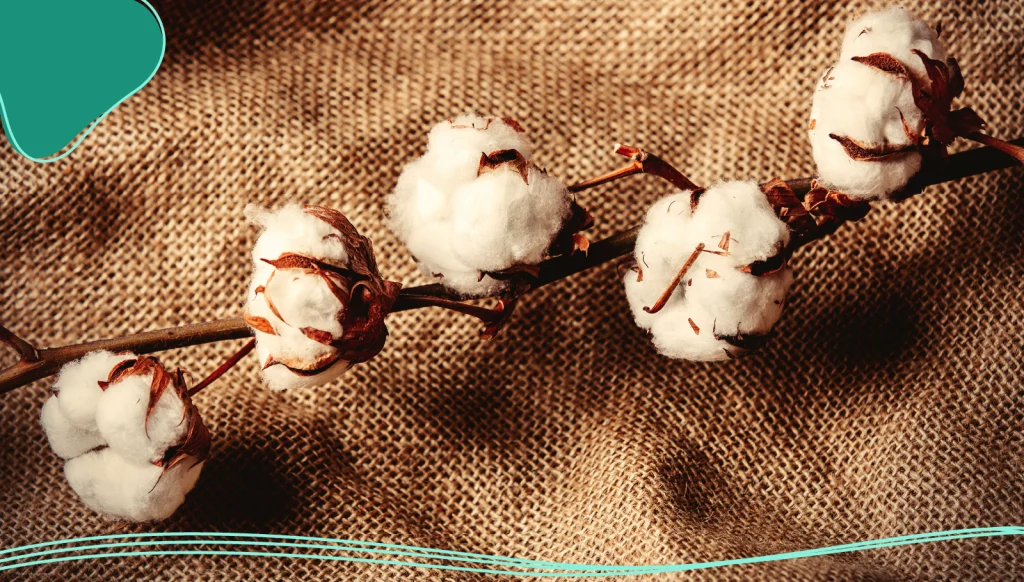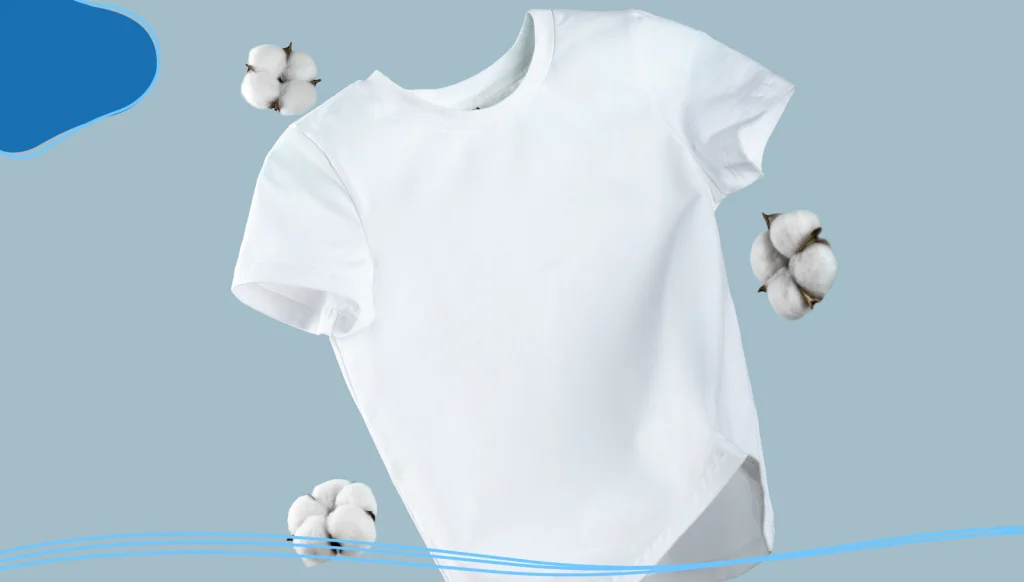How a company handles its promotional apparel is a direct reflection of that company’s core values. You can tell a lot about a brand by the level of effort that they put into their promotional apparel. This goes beyond what is printed on the apparel and extends to what materials are used and how those materials are processed.
Suppose a company goes the extra step to use organic cotton for its promotional apparel instead of conventional cotton. In that case, it would be a sign that that company is working towards being more sustainable and eco-friendly.
In this article, we’ll go over what organic cotton is, how it’s different from conventional cotton, what organic cotton production looks like, and the pros and cons of using organic cotton in your company’s promotional apparel.
- What Is Organic Cotton?
- The Benefits of Organic Cotton Apparel
- Organic Cotton Production & Certification
- Maximizing Impact with Organic Cotton Apparel
- Popular Brands that Use Organic Cotton

What Is Organic Cotton?
Organic cotton is not your average fabric. Unlike conventional cotton, it is grown without the use of harmful chemicals, pesticides, or genetically modified organisms (GMOs).
Side Note: You might have heard the term “GMO” being thrown around without really knowing what it means. A GMO is an animal, plant, or microbe whose DNA has been altered using genetic engineering techniques. While bioengineering is not always bad, it can often result in foods and materials that have been changed unnaturally and are not good for our health.
Organic cotton is cultivated using sustainable farming methods that prioritize soil health and biodiversity. No synthetic fertilizers or toxic pesticides are used, resulting in a fabric that is safer for the environment and for those who wear it.
The Differences Between Organic Cotton & Conventional Cotton
Cotton is naturally derived from the cotton plant, which makes it a renewable and biodegradable material. However, the production of conventional cotton uses a tremendous amount of insecticides and pesticides, which are highly toxic and can contaminate groundwater while contributing to climate change.
An additional problem that accompanies cotton production is the large water consumption. According to WWF, it takes more than 20,000 liters (5,283 gallons) of water to produce just one kilogram of cotton.
In recent years, there has been a focus on cotton’s negative impact and a call for more ethical and sustainable practices. In turn, organic cotton production has become more popular. Making use of natural fertilizers instead of toxic ones, organic cotton creates less greenhouse gas emissions and doesn’t contaminate our planet as much as conventional cotton.
Why Isn’t Organic Cotton More Available
While organic cotton is a more eco-friendly option, less than 1% of the cotton grown globally is organic. Conventional cotton can be grown in greater quantities because of the genetic modifications and chemicals that protect and nourish the plant. To grow organic cotton, you need to clear out additional land. This could cause more problems than it solves, as it could lead to deforestation and a loss of biodiversity.
In the United States, cotton plantations must meet the requirements enforced by the National Organic Program (NOP) from the USDA to be considered organic. Organic cotton is also frequently grown in subtropical countries such as India and Turkey.

The Benefits of Organic Cotton Apparel
While organic cotton has its drawbacks, there are also a great deal of benefits that come with the more environmentally conscious material. Here are a few of the main benefits:
1. Environmentally Friendly Production
Conventional cotton uses 16%-25% more pesticides and herbicides than any other crop. Some of these chemicals are among the most deadly in the world. Organic cotton is grown without the use of synthetic pesticides, herbicides, or genetically modified organisms (GMOs).
This significantly reduces the environmental impact compared to conventional cotton farming.
By opting for organic cotton, you’re supporting farming practices that protect soil health, conserve water, and promote biodiversity.
2. Healthier for Consumers & Farmers
Clothing made from organic cotton is free from harmful chemicals, making it safer for those who wear it. This is particularly important for promotional apparel, which is often distributed in large quantities.
When recipients know that the clothing they receive is made from natural, non-toxic materials, they are more likely to wear it and associate your brand with positive values. Additionally, organic farming practices protect farmers from exposure to toxic chemicals, improving their health and quality of life.
3. Superior Quality & Comfort
Organic cotton is the best choice for people with sensitive skin, allergies, and chemical sensitivities. Without chemical processing, the fibers remain intact, resulting in a more comfortable, long-lasting product.
Promotional apparel like t-shirts and hoodies made from organic cotton not only feel better but also maintain quality through repeated washes and wears. This boosts brand visibility over time as your promotional items stay in good condition for longer.
4. Strengthens Brand Reputation
Today’s consumers are increasingly making purchasing decisions based on a brand’s commitment to sustainability. By choosing organic cotton for promotional apparel, you demonstrate a dedication to ethical practices and environmental responsibility. This can improve your brand’s reputation, fostering loyalty and trust among eco-conscious consumers.
5. Reduces Carbon Footprint
Organic cotton produces around 46% less CO2e compared to conventional cotton. This lower carbon footprint contributes to the global fight against climate change.
By aligning your brand with these efforts, you can show that your company is part of the solution, not the problem.
6. Meets Growing Demand for Sustainable Products
Market trends indicate that the demand for sustainable and ethical products is on the rise. By offering promotional apparel made from organic cotton, your brand taps into this growing market segment. It shows that you’re forward-thinking and responsive to consumer needs.
7. Promotes Biodiversity
Organic cotton uses less water and encourages biodiversity. Growers typically use more rainwater for irrigation and rely on beneficial insects to control unwanted pests. When you choose organic cotton instead of synthetic fibers, you ensure that no microplastics are entering waterways through your everyday laundering.
Plus, organic cotton is completely biodegradable.

Organic Cotton Production & Certification
There are several global organizations that ensure that organic cotton production is monitored and conducted properly. Here are some of the main organizations to look into if you want to know more about where your organic cotton apparel comes from and how it’s made.
Global Organic Textile Standard (GOTS): The “green” standard to which Organic Cotton Textiles are produced. GOTS ensures that every facility is inspected and each step is certified right through to the warehouse.
Organic Trade Association (OTA): A membership-based business association for the organic industry in North America.
Fairtrade International: A large percentage of Fairtrade cotton is also organic certified, and Fairtrade encourages and empowers cotton farmers to protect the natural environment.
Maximizing Impact with Organic Cotton Apparel
You can use organic cotton apparel as a powerful marketing tool to promote your brand’s values and commitment to sustainability. As consumers become more environmentally conscious, using sustainably sourced materials for your promotional apparel will become a necessity.
Here are some of the ways that you can help create a more eco-friendly brand identity.
- Partner with suppliers who share your values and prioritize environmental and social responsibility.
- Educate your customers about the benefits of organic cotton and the positive impact of choosing sustainable apparel.
- Consider donating a portion of your sales to environmental or social causes to amplify your brand’s impact further.

Get Custom Promotional Apparel from LogoMaker
Whatever your personalized clothing needs are, LogoMaker can help. Create a custom sweatshirt for your side hustle, or give company logo shirts away at your annual summer bash. LogoMaker makes it easy to design custom logo apparel for any product or need. Promotional apparel from LogoMaker is made with the highest quality cotton to ensure comfort and sustainability.

Popular Brands that Use Organic Cotton
Patagonia
Patagonia, one of the leading changemakers of environmental ethics in the clothing industry, dedicated to using only 100% virgin organic cotton in all their products going back to 1996.
The brand uses four types of cotton in their products including recycled cotton, organically farmed cotton, cotton that’s grown with organic practices and that’s on its way to becoming certified, and organic cotton using regenerative practices.
Zara
Zara’s primary approach to sustainable products is its Join Life initiative. The garments in this collection are taking steps toward sustainability through processes and raw materials that reduce environmental impact. Garments are manufactured using eco-friendly materials such as organic cotton, Tencel, recycled polyester and more.
The brand also launched its Pre-Owned range in 2022 to reduce the amount of waste garments heading to landfills. The collection offers repairs and person-to-person sales of pre-owned Zara items.
Recycling bins are also positioned in many stores so that customers can deposit old clothing to be sent to reuse and recycling partners.
Mate the Label
From tees and tanks to shorts and sweatshirts, MATE the Label only uses natural and nontoxic materials when crafting its apparel, like low-impact dyes, certified organic cotton, and Tencel.
The company keeps its carbon footprint small, too, as its factory is 17 miles from its headquarters, meaning all pieces are sewn, dyed, and shipped from LA. The packaging is entirely made from recycled materials, and there’s a recycling program in place for old pieces.
Conclusion
Choosing organic cotton for promotional apparel is more than just a trend—it’s a meaningful step toward a more sustainable future. Not only does it benefit the environment and the people involved in the production process, but it also enhances your brand’s image and appeal. In an era where values-driven decisions resonate deeply with consumers, investing in organic cotton clothing is a powerful way to showcase your commitment to a better world.
If you want to invest in sustainable apparel, LogoMaker offers high-quality cotton apparel with low prices and no order minimums for custom apparel with a logo.

Frequently Asked Questions
Is organic cotton more expensive than conventional cotton?
Yes, organic cotton can be more expensive due to labour-intensive farming practices and the absence of synthetic chemicals. However, the long-term benefits to the environment and health often outweigh the initial cost.
How can I verify if the promotional apparel is truly organic?
Look for certifications such as GOTS (Global Organic Textile Standard) or OEKO-TEX. These certifications ensure that the cotton meets stringent organic and ethical production standards.
Does organic cotton shrink more than regular cotton?
Organic cotton may shrink slightly after the first wash, similar to conventional cotton. Following care instructions, such as washing in cold water and air-drying, can help minimize shrinkage.
Is organic cotton durable enough for promotional apparel?
Yes, organic cotton is known for its durability. The absence of harsh chemicals during production helps preserve the integrity of the fibers, resulting in long-lasting apparel.
Can organic cotton be dyed and printed like regular cotton?
Absolutely. Organic cotton can be dyed and printed using eco-friendly dyes and processes, ensuring vibrant and high-quality promotional products.



